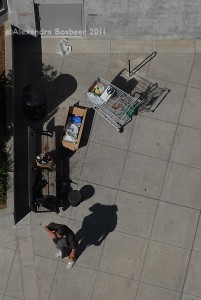Maladjusted
Sometimes the Internet makes one’s work in delving through books much lighter than it would otherwise be. I was recently directed to this gem of a point of view from Martin Luther King, from a speech in 1967 in an address to the American Psychological Association:
”… I am sure that we will recognize that there are some things in our society, some things in our world, to which we should never be adjusted. There are some things concerning which we must always be maladjusted if we are to be people of good will. …We must never adjust ourselves to economic conditions that take necessities from the many to give luxuries to the few. We must never adjust ourselves to the madness of militarism, and the self-defeating effects of physical violence…..As President Kennedy declared, ‘Mankind must put an end to war, or war will put an end to mankind.’ …. Men and women should be … maladjusted …”The adjustment Martin Luther King protests also impels us to fight to prevent change to our environment, even if the status quo is not comfortable. I say this stems from the phenomenon of ‘the devil you know’; a disinherited cousin of the view of the grass being greener elsewhere. (We suspect the greenness of the grass is an illusion, so we fight to keep our familiar, slightly yellowed and pesticide-damaged grass.)
Overadjustment is caused in part by our habit of becoming adapted to our surroundings, even to injustice. In Portland, Oregon, the 4,600 homeless people are often not even noticed any more by the non-homeless driving along the street, just as you don’t really notice anymore your green corduroy couch anymore or how worn out it is.
Noticing is a sense sharpened by traveling : to notice everything afresh, as if it is new, from unusual fruits in tropical markets and wonderfully bright house walls, to the spring flowers and lack of sidewalks in the English countryside where I am now. And becoming accustomed to an unchanging context is a natural response – if one were always as alert to everything, we’d be as tired as we are when traveling and learning a new culture. And this human habit is hard to overcome. We are rightfully proud of Quakers for being part of the vanguard in many important movements for change, such as the antislavery movement. Yet, several Quaker meetings in the US in slavery times also disowned members for agitating too hard, for ‘rocking the boat’ pertaining to slavery – and how some Quakers made their money (see Fit for Freedom But Not for Friendship). This is not so different from those today who forget to notice the changing global atmospheric climate. They want the urgency of climate change to slow down, for a windmill in the sea to be sufficient, to wait for other countries to take more steps, or to be justified in ignoring the problem. Halting the spiraling crisis requires a complete re-think of how to organize the economy, how to persuade people to live more simply, to how have a robust economy without consumerism. we must be mal-adjusted to our current world; it is the only way we will find new ways to live.



Leave a Reply